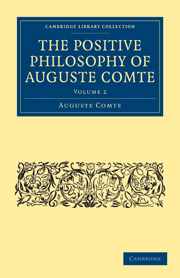Book contents
- Frontmatter
- Contents
- CHAPTER I NECESSITY AND OPPORTUNENESS OF THIS NEW SCIENCE
- CHAPTER II PRINCIPAL PHILOSOPHICAL ATTEMPTS TO CONSTITUTE A SOCIAL SCIENCE
- CHAPTER III CHARACTERISTICS OF THE POSITIVE METHOD IN ITS APPLICATION TO SOCIAL PHENOMENA
- CHAPTER IV RELATION OF SOCIOLOGY TO THE OTHER DEPARTMENTS OF POSITIVE PHILOSOPHY
- CHAPTER V SOCIAL STATICS, OR THEORY OF THE SPONTANEOUS ORDER OF HUMAN SOCIETY
- CHAPTER VI SOCIAL DYNAMICS; OR THEORY OF THE NATURAL PROGRESS OF HUMAN SOCIETY
- CHAPTER VII PREPARATION OF THE HISTORICAL QUESTION.—FIRST THEOLOGICAL PHASE: FETICHISM.—BEGINNING OF THE THEOLOGICAL AND MILITARY SYSTEM
- CHAPTER VIII SECOND PHASE: POLYTHEISM.—DEVELOPMENT OF THE THEOLOGICAL AND MILITARY SYSTEM
- CHAPTER IX AGE OF MONOTHEISM.—MODIFICATION OF THE THEOLOGICAL AND MILITARY SYSTEM
- CHAPTER X METAPHYSICAL STATE, AND CRITICAL PERIOD OF MODERN SOCIETY
- CHAPTER XI RISE OF THE ELEMENTS OF THE POSITIVE STATE.—PREPARATION FOR SOCIAL REORGANIZATION
- CHAPTER XII REVIEW OF THE REVOLUTIONARY CRISIS.—ASCERTAINMENT OF THE FINAL TENDENCY OF MODERN SOCIETY
- CHAPTER XIII FINAL ESTIMATE OF THE POSITIVE METHOD
- CHAPTER XIV ESTIMATE OF THE RESULTS OF POSITIVE DOCTRINE IN ITS PREPARATORY STAGE
- CHAPTER XV ESTIMATE OF THE FINAL ACTION OF THE POSITIVE PHILOSOPHY
CHAPTER III - CHARACTERISTICS OF THE POSITIVE METHOD IN ITS APPLICATION TO SOCIAL PHENOMENA
Published online by Cambridge University Press: 29 August 2010
- Frontmatter
- Contents
- CHAPTER I NECESSITY AND OPPORTUNENESS OF THIS NEW SCIENCE
- CHAPTER II PRINCIPAL PHILOSOPHICAL ATTEMPTS TO CONSTITUTE A SOCIAL SCIENCE
- CHAPTER III CHARACTERISTICS OF THE POSITIVE METHOD IN ITS APPLICATION TO SOCIAL PHENOMENA
- CHAPTER IV RELATION OF SOCIOLOGY TO THE OTHER DEPARTMENTS OF POSITIVE PHILOSOPHY
- CHAPTER V SOCIAL STATICS, OR THEORY OF THE SPONTANEOUS ORDER OF HUMAN SOCIETY
- CHAPTER VI SOCIAL DYNAMICS; OR THEORY OF THE NATURAL PROGRESS OF HUMAN SOCIETY
- CHAPTER VII PREPARATION OF THE HISTORICAL QUESTION.—FIRST THEOLOGICAL PHASE: FETICHISM.—BEGINNING OF THE THEOLOGICAL AND MILITARY SYSTEM
- CHAPTER VIII SECOND PHASE: POLYTHEISM.—DEVELOPMENT OF THE THEOLOGICAL AND MILITARY SYSTEM
- CHAPTER IX AGE OF MONOTHEISM.—MODIFICATION OF THE THEOLOGICAL AND MILITARY SYSTEM
- CHAPTER X METAPHYSICAL STATE, AND CRITICAL PERIOD OF MODERN SOCIETY
- CHAPTER XI RISE OF THE ELEMENTS OF THE POSITIVE STATE.—PREPARATION FOR SOCIAL REORGANIZATION
- CHAPTER XII REVIEW OF THE REVOLUTIONARY CRISIS.—ASCERTAINMENT OF THE FINAL TENDENCY OF MODERN SOCIETY
- CHAPTER XIII FINAL ESTIMATE OF THE POSITIVE METHOD
- CHAPTER XIV ESTIMATE OF THE RESULTS OF POSITIVE DOCTRINE IN ITS PREPARATORY STAGE
- CHAPTER XV ESTIMATE OF THE FINAL ACTION OF THE POSITIVE PHILOSOPHY
Summary
In every science conceptions which relate to method are inseparable from those which relate to the doctrine under consideration. The method has to be so varied in its application, and so largely modified by the complexity and special nature of the phenomena, in each case, that any general notions of method would be too indefinite for actual use. If, therefore, we have not separated the method from the doctrine in the simpler departments of science, much less should we think of doing so when treating of the complex phenomena of social life, to say nothing of the great feature of this last case,—its want of positivity. In the formation of a new science the general spirit of it must be seized before its particular parts can be investigated: that is, we must have some notion of the doctrine before examining the method, and then the method cannot be estimated in any other way than by its use. Thus, I have not to offer a logical exposition of method in social physics before proceeding to the science itself; but I must follow the same plan here as in the case of the anterior sciences,—ascertaining its general spirit, and what are the collective resources proper to it. Though these subjects may be said to belong to the science itself, we may consider them as belonging to the method, as they are absolutely necessary to direct our understandings in the pursuit of this difficult study.
- Type
- Chapter
- Information
- The Positive Philosophy of Auguste Comte , pp. 67 - 110Publisher: Cambridge University PressPrint publication year: 2009First published in: 1853
- 1
- Cited by



